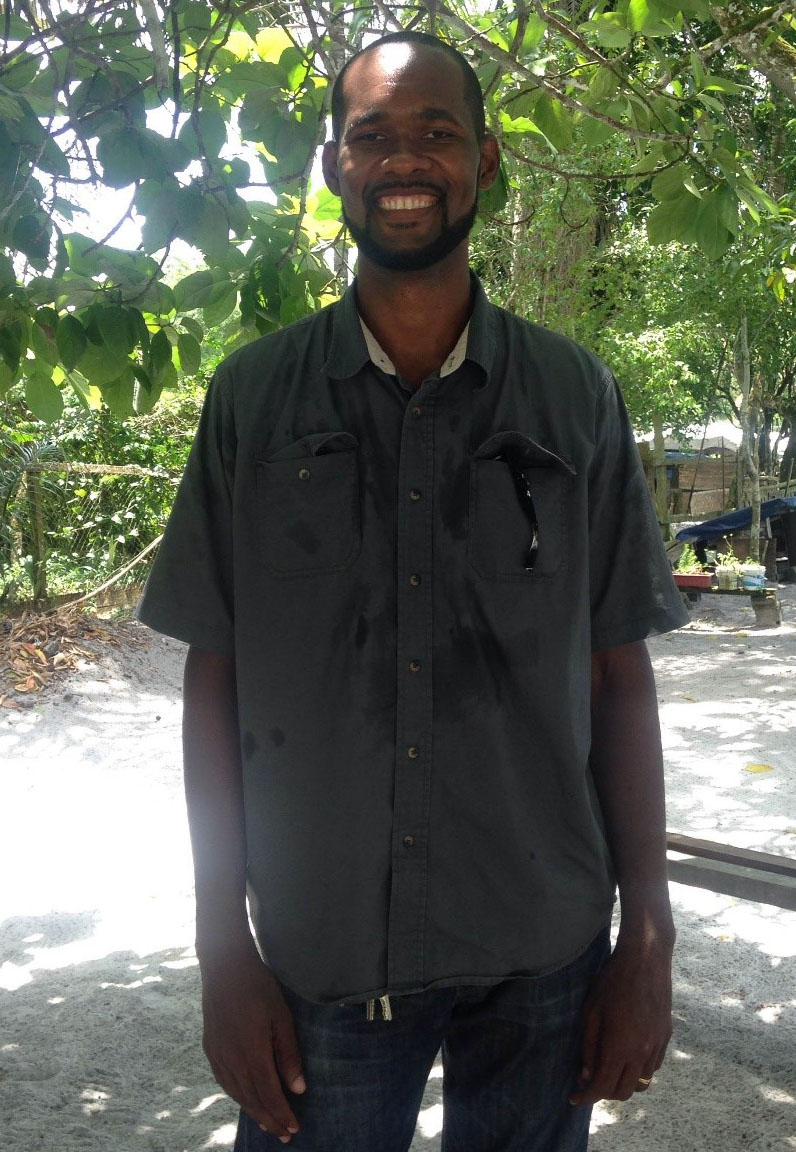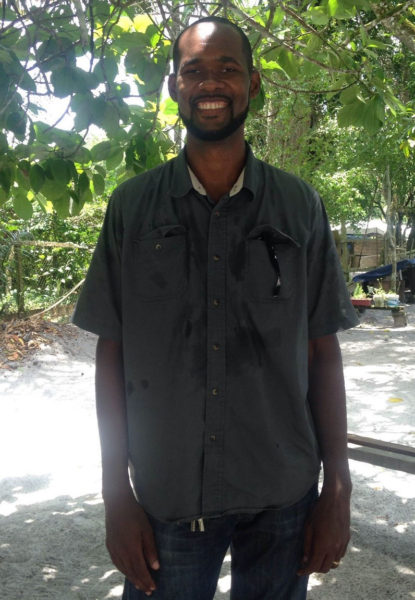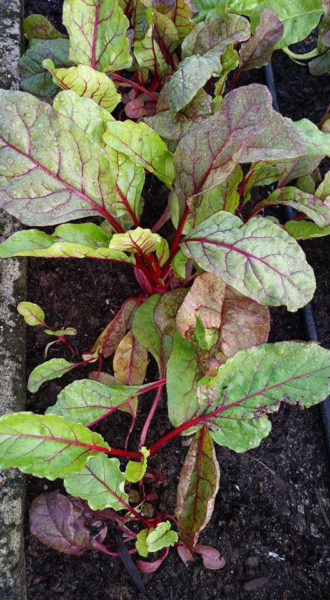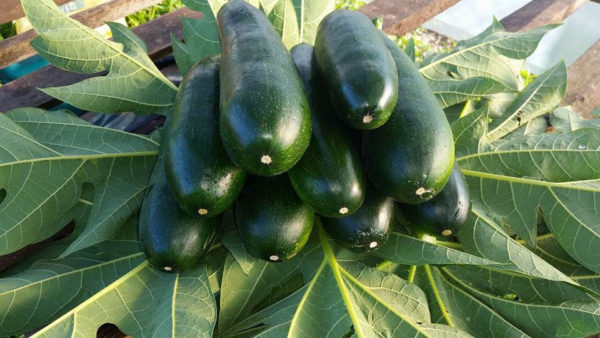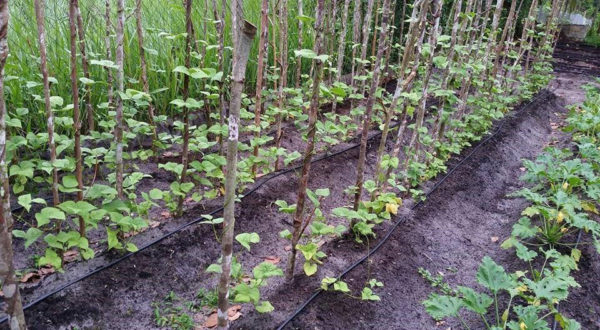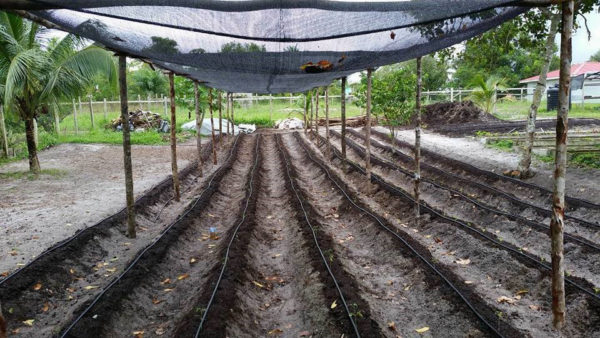With an appreciation for Guyana’s agriculture potential and a dream of one day establishing an expansive fruit orchard of his own, one overseas-based Guyanese has returned home to enhance the local agriculture industry with his own venture and is urging other Guyanese to do the same.
A resident of Kuru-Kururu on the Linden/Soesdyke Highway and a former student of President’s College, Lumumba Angoy left Guyana’s shores more than a decade ago to pursue an education and says that he established himself as a certified tax accountant and a small business consultant in the United States.
And like many other Guyanese in the diaspora who wanted to participate in Guyana’s Golden Jubilee of Independence, Angoy returned home, not only to be part of the celebrations but to also begin work on a new business venture in his childhood community of Kuru-Kururu.
The venture, Lasana Farms- a name derived from what Angoy described as a simple formula of the first and last initials of his name along with those of his wife and son, specialises in the production of non-traditional crops such as, chard, zucchini, string beans, kale, sweet peppers, habanero peppers, jalapeno peppers, broccoli and tomatoes. With new additions to include beets, ochro, eggplant, mint, cucumber, pak choi and parsley.
In a recent interview with Stabroek News, Angoy explain-ed that his passion for agriculture was fostered by his grandmother’s interest in small scale farming as well as the community’s history as a ‘farming co-op’.
“I grew up here (Kuru-Kururu) and for anyone who knows the history of this area, this use to be a farming co-op and I don’t think it has ever realised its full potential for one reason or the other. My grandmother was among the pioneering folks that came into the area and we have always dabbled at household scale in farming,” Angoy said.
“I always had a desire to do agriculture and I have planned the next five to six years of my life so that I could come back to Guyana and follow the passion I had. I started the whole process last September when I tested a small batch to see how the varieties would grow. I came back in May of this year and I really started doing work on the farm endurance so the real work began in June,” he added.
In explaining the existing elements of his farm, Angoy said there were fourteen crop varieties not native to Guyana at present, plant material for which was sourced from the US. All of which is nestled on a half-acre of land located behind his aunt’s house at 373 Kuru-Kururu.
In explaining his selection of crops, Angoy noted that he did not see it as a wise business decision to base his business venture on the production of the traditional crops like bora, thus he decided to “think outside the box” and focus on the less traditional varieties.
Because the venture is still in its infancy, Angoy said that he chose to take responsibility for the day-to-day management of his farm, which allows him to make assessments as he goes along.
“I do most of this by myself and while I would love to move a bit faster with this, I really want to do the first stage of this by myself as a test. The next plot I will be moving a little bit faster and will be using labour because one of the motives of wanting to farm is also to create jobs,” he explained.
Offering some insight into his daily routine, he said his days are not as hectic since he has already done the ground work which included time being spent preparing the beds for seedlings among other activities.
Now, the focus is on crop management and marketing and other less taxing activities like watering seedlings, monitoring insects and pollinating the zucchinis.
Irrigation
With regards to irrigation of his plot, Stabroek News observed Angoy’s decision to implement a ‘drip system. This system is said to be one that that saves water and fertiliser by allowing water to descend slowly to the roots of many different plants, either via the soil surface or directly onto the root zone, through a network of valves, pipes, tubing and emitters.
Elaborating on his decision to utilise this method, Angoy explained that not only does it save him time as compared to time spent if he were to use the traditional watering can, but it also saves water.
While there is a cost attached to the system that comes with having to purchase hoses, valves etc, he believes it will all pay off in the long run and would recommend that other farmers try it.
And although he does not market his business as being organic, Angoy says that he uses organic fertiliser and his intention is to continue as long as possible.
“Well I don’t like to market myself as organic, I use organic manure; I am not certified organic, I know there is a particular section of society that really understands what organic means…so I prefer to say I do farming, if asked I say I use organic manure and there you have it,” he explained. He uses chicken manure.
Angoy stated that he lets the manure cure for a six-month period before he applies it to his plants. The length of time the manure sits before it is applied to the plant facilitates the breakdown of nitrogen, making it easier to be used on his crops.
He noted that this is just the initial phase and he hopes to establish a fruit orchard in the near future.
“What I really want to do is orchard farming so I can value add those through processing to make juices and concentrates…this is just me hastening into agriculture until such time I can do orchard farming,” he said.
But in working towards achieving this goal, Angoy has been faced with several challenges, primarily access to land.
“I applied for land farther up the highway and I would love to have that at my disposal so I can really get into the key area of farming that I am interested in,” Angoy said.
Other challenges include those that present themselves in the form of insects, more specifically crickets and cut worms, he said.
“Sometime in the morning I have to check to see how many plants the crickets have taken overnight, in disgust you say a prayer that they won’t take anymore,” he joked.
Asked about pest controls systems in place, Angoy expressed hopes of soon being able to implement natural methods of pest control as he strives to maintain the organic aspect of his venture.
“I’ll squish them for now but as I expand, I will implement, that’s the mantra so to speak… I wouldn’t want to be using pesticides…I want to use as much organic methods as possible,” Angoy said.
But while he waits his land application to be accepted and processed, Angoy said he will work towards the construction of a greenhouse a short distance away from where his current setup is located.
With regards to his marketing strategy, Angoy acknowledged social media site Facebook as the go to marketing tool at present, saying that he has received many orders for zucchini since the page was developed.
“I am to find that out the hard way by just making the produce available and seeing how the market responds. For the short period I have publicised on this, I have been receiving a number of calls for orders of zucchini and I don’t think I have enough to fill the orders,” Angoy said.
Looking ahead, he shared his hopes of being able to be a provider of fresh produce to local supermarkets and other entities in the food industry. Angoy encouraged the public to try his products as the prices are market competitive. He also encouraged Guyanese to recognise that agriculture is one of the most beneficial industries that Guyanese can pursue.
“We have large tracts of land and abundant human resources, there are some areas in which we need to develop but I think if enough folks like myself continue what they’re doing, it may provide insight for others who might have an interest,” he offered.
Additionally, he challenged others to gear their minds towards developing a processing and exporting industry.
“I don’t think it would be wise to gear large scale production of certain things to the Guyanese market…so the end goal for Guyanese I believe should be processing and exporting. We do a tremendous amount of importing in Guyana and … we under realise some of our potential as a nation. If we can meet market standards and market quantity, then I think it would be best if you take the export route with the things we grow in Guyana,” Angoy added.
Lasana Farms can be contacted through its Facebook book page at https://www.facebook. com/Lasana-Farms or on phone number 623 3276.
